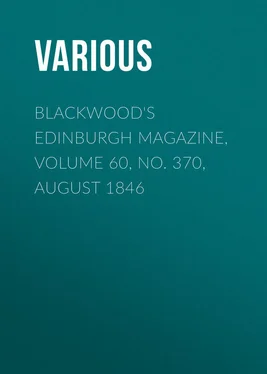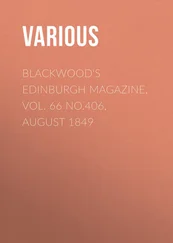Various - Blackwood's Edinburgh Magazine, Volume 60, No. 370, August 1846
Здесь есть возможность читать онлайн «Various - Blackwood's Edinburgh Magazine, Volume 60, No. 370, August 1846» — ознакомительный отрывок электронной книги совершенно бесплатно, а после прочтения отрывка купить полную версию. В некоторых случаях можно слушать аудио, скачать через торрент в формате fb2 и присутствует краткое содержание. Издательство: Иностранный паблик, Жанр: periodic, foreign_edu, Путешествия и география, на английском языке. Описание произведения, (предисловие) а так же отзывы посетителей доступны на портале библиотеки ЛибКат.
- Название:Blackwood's Edinburgh Magazine, Volume 60, No. 370, August 1846
- Автор:
- Издательство:Иностранный паблик
- Жанр:
- Год:неизвестен
- ISBN:нет данных
- Рейтинг книги:3 / 5. Голосов: 1
-
Избранное:Добавить в избранное
- Отзывы:
-
Ваша оценка:
- 60
- 1
- 2
- 3
- 4
- 5
Blackwood's Edinburgh Magazine, Volume 60, No. 370, August 1846: краткое содержание, описание и аннотация
Предлагаем к чтению аннотацию, описание, краткое содержание или предисловие (зависит от того, что написал сам автор книги «Blackwood's Edinburgh Magazine, Volume 60, No. 370, August 1846»). Если вы не нашли необходимую информацию о книге — напишите в комментариях, мы постараемся отыскать её.
Blackwood's Edinburgh Magazine, Volume 60, No. 370, August 1846 — читать онлайн ознакомительный отрывок
Ниже представлен текст книги, разбитый по страницам. Система сохранения места последней прочитанной страницы, позволяет с удобством читать онлайн бесплатно книгу «Blackwood's Edinburgh Magazine, Volume 60, No. 370, August 1846», без необходимости каждый раз заново искать на чём Вы остановились. Поставьте закладку, и сможете в любой момент перейти на страницу, на которой закончили чтение.
Интервал:
Закладка:
Assuming limitation of service and the abolition of corporal punishment to have been conceded, the next thing demanding attention would be the education of the soldier. This has hitherto been sadly neglected, strangely so at a period and in a country where education of the people is so strongly and generally advocated. The schoolmaster is abroad, we are told – we should be glad to hear of his visiting the barrack-room. To no class of the population would a good plain education be more valuable than to the soldier, as a means of filling up his abundant leisure, of improving his moral condition, and preserving him from drunkenness and vice. How extraordinary that its advantages should so long have been overlooked, even by those to whom they ought to have been the most palpable. "Of two hundred and fourteen officers," Mr Marshall writes, "who returned answers to the following query, addressed to them by the General Commanding in Chief, in 1834, only two or three recommended intellectual, moral, or religious cultivation as a means of preventing crime: – 'Are you enabled to suggest any means of restraining, or eradicating the propensity to drunkenness, so prevalent among the soldiery, and confessedly the parent of the majority of military crimes?' A great variety of penal enactments were recommended, but no one suggested the school master's drill but Sir George Arthur and the late Colonel Oglander. The colonel's words are: – 'The only effectual corrective of this, as of every other vice, is a sound and rational sense of religion. This is the only true foundation of moral discipline. The establishment of libraries, and the system of adult schools, would be useful in this view.'" To prevent crime is surely better than to punish it. Vast pains are taken with the merely military education of the soldier. A recruit is carefully drilled into the perpendicular, taught to handle his musket, mount his guards, clean his accoutrements – converted, in short, into an excellent automaton – and then he is dismissed as perfect, and left to lounge away, as best he may, his numerous hours of daily leisure. He has perhaps never been taught to read and write, or may possess those accomplishments but imperfectly. What more natural than to encourage, and, if necessary, to compel him to acquire them, together with such other useful scholarship as it may be desirable for him to possess? Education would be especially valuable under a system of limited service. The soldier, leaving the army when still a young man, would be better fitted than before he entered it, for any trade or occupation he might adopt. And when the lower classes found that military service was made a medium for the communication of knowledge, and that their sons, after seven years passed under the colours, were better able to get through the world advantageously and creditably than when they enlisted, the present strong prejudice against a soldier's life would rapidly become weakened, and finally disappear. The army would then be looked upon by poor men with large families as no undesirable resource for temporarily providing for one or two of their sons.
It is certainly not creditable to this country, that in France, Prussia, Holland, and even in Russia – that land of the serf and the Cossack – greater pains are taken with the education of the soldier than in free and enlightened England. It has become customary to compare our navy with that of France, and when we are found to have a carronade or a cock-boat less than our friends across the water, a shout of indignation is forthwith set up by vigilant journalists and nervous naval officers. We heartily wish that it were equally usual to contrast our army with that of the French – not in respect of numbers, but of the attention paid to the education and moral discipline of the men. Every French regiment has two schools, a higher and a lower one. In the latter are taught reading, writing, and arithmetic; in the former, geography, book-keeping, the elements of geometry and fortification, and other things equally useful. The schools are managed by lieutenants, aided by non-commissioned officers; and sergeants recommended for commissions are required to pass an examination in the branches of knowledge there taught. It is well known that in the French service, as in most others, excepting the English, a proportion of the commissions is set aside for the sergeants. In the Prussian service there is a school in each battalion, superintended by a captain and three lieutenants, who receive additional pay for alternately taking a share in the instruction of the soldiers. "Non-commissioned officers," Mr Marshall informs us, "who wish to become officers, first undergo an examination in geography, history, simple mathematics, and the French and German languages. At the end of another year they are again examined in the same branches of knowledge, and also in algebra, military drawing, and fortification. If they pass this second examination, they become officers."
How many of the young men, who, by virtue of interest or money, enter the British army as ensigns and cornets, would be found willing to devote even a small portion of their time to the instruction of the soldier? Very few, we fear. By the majority, the idea would be scouted as a bore, and as quite inconsistent with their dignity. Extra pay, however acceptable to the comparatively needy Prussian lieutenant, might be expected to prove an insufficient inducement in a service where it is frequently difficult to find a subaltern to accept the duties of adjutant. None can entertain a higher respect than we do for the gallant spirit and many excellent qualities of the present race of British officers; but we confess a wish that they would view their profession in a more serious light. Young men entering the army seemingly imagine, that the sole object of their so doing is to wear a well-made uniform, and dine at a pleasant mess; and that, once dismissed to their duty by the adjutant, they may fairly discard all idea of self-instruction and improvement. But war is an art, and therefore its principles can be acquired but by study. Our young officers too often neglect not only their military studies, but their mental improvement in other respects; forgetting that the most valuable part of a man's education is not that acquired at a public school before the age of eighteen, but that which he bestows upon himself after that age. The former is the foundation; the latter the fabric to be raised upon it. We have known instances of smart subs deft upon parade, brilliants in the ball-room, perfect models of a pretty soldier from plume to boot-heel, so supremely ignorant of the common business of life as to be unable to write a letter without a severe effort, or to draw a bill upon their agents when no one was at hand to instruct them in its form. It was but the other day that an officer related to us, that, being detached on an outpost in one of our colonies, he found himself in company with two brother subalterns, both most anxious to make a call upon their father's strong-box, but totally ignorant how to effect the same. Their spirit was very willing, but their pen lamentably weak; their exchequer was exhausted, and in their mind's-eye the paternal coffers stood invitingly open; but nevertheless they sat helpless, ruefully contemplating oblong slips of blank paper, until our friend, whose experience as a man of business was somewhat greater, extricated them from their painful dilemma, by drawing up the necessary document at thirty days' sight . In this particular view, want of skill as a "pen and ink man" would probably not be regretted by those most interested in their sons; and doubtless many governors would exclaim, as fervently as Lord Douglas in Marmion ,
"Thanks to St Bothan, son of mine
Could never pen a written line!"
Seriously speaking, a graver and more studious tone is wanted in our service. It is found in the military services of other countries. German and French officers take their calling far more au sérieux than do ours. They find abundant time for pleasure, but also for solitude and reading, and for attention to the improvement of the soldier. Dressing, dining, and cigars, and beating the pavements of a garrison town with his boot-heels, ought not to fill up the whole time of a subaltern officer. That in this country they usually do so, will be admitted by all who have had opportunities of observing young English officers in peace time. We could bring hosts of witnesses in support of our assertion, but will content ourselves with one whose competency to judge in such matters will not be disputed. The following passages are from Major-General Sir George Arthur's "General Observations upon Military Discipline, and the Intellectual and Moral Improvement of both Officers and Soldiers."
Читать дальшеИнтервал:
Закладка:
Похожие книги на «Blackwood's Edinburgh Magazine, Volume 60, No. 370, August 1846»
Представляем Вашему вниманию похожие книги на «Blackwood's Edinburgh Magazine, Volume 60, No. 370, August 1846» списком для выбора. Мы отобрали схожую по названию и смыслу литературу в надежде предоставить читателям больше вариантов отыскать новые, интересные, ещё непрочитанные произведения.
Обсуждение, отзывы о книге «Blackwood's Edinburgh Magazine, Volume 60, No. 370, August 1846» и просто собственные мнения читателей. Оставьте ваши комментарии, напишите, что Вы думаете о произведении, его смысле или главных героях. Укажите что конкретно понравилось, а что нет, и почему Вы так считаете.












